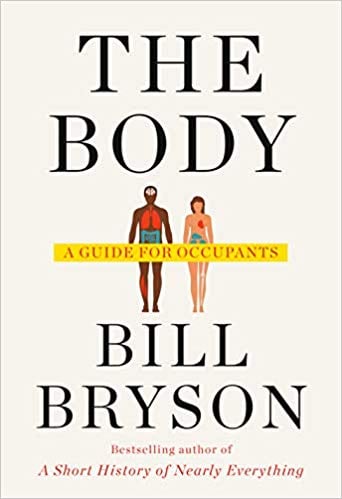You have /5 articles left.
Sign up for a free account or log in.
 The Body: A Guide for Occupants by Bill Bryson
The Body: A Guide for Occupants by Bill Bryson
Published in October 2019
Can an author who doesn't live in the U.S. still be called a national treasure? Notwithstanding the tricky geographic challenge of Bryson having resided in England since 2003, that appellation surely fits Bill Bryson.
Reading a Bryson book is always a pleasure. In the case of The Body and some other Bryson books (but not all), the author narrates his own text. Hearing Bryson read his work aloud is truly a delight.
Each time I read a Bill Bryson book, I smile to think that for some years of his life (1995 to 2003) in the college town that I now work and reside. We missed each other by three years, which makes me sad, as I would have taken Bryson to Lou's for breakfast to talk about his books. The fact that Bryson chose to live in Hanover, N.H., without any affiliation to the town's small local college, speaks highly about the quality of life on offer in small college towns.
The Body is typical Bryson, in that the book is jam-packed with ideas and facts and trivia. Recent Bryson books, most notably The Body, A Short History of Nearly Everything and At Home: A Short History of Private Life, read something like facts set to music. The amount of data that Bryson can cram into his books is impressive, made more so by the fact that his books are not especially concise. The Body comes in at 464 pages, or 14 hours and four minutes.
While reading The Body (switching between my eyes and my ears), I did feel as if I was getting very smart indeed. Bryson finds something that is counterintuitively fascinating about every bodily system, organ and process. He not only explains how the body works, but what can go wrong and why.
The challenge in reading The Body lies less with the author, but the reader. You will get much more out of The Body if you come to read the book with greater anatomical and medical knowledge than a sociologist.
While reading The Body, I tried to make a point of stopping and sharing whatever surprising medical tidbit or fact that Bryson was sharing with my medical doctor wife. What was big news to me (can you explain what the pancreas really does, or how the heart actually works), was super obvious to her. The irony is that as an academic physician, my wife lacks the time to read The Body, although she would likely get far more out of the book in terms of retention than I did.
Where The Body should be liberally handed out is among medical students. I have no idea if there is a tradition to hand out books the summer before first-year med students arrive on campus. If that tradition exists, The Body would be an excellent selection.
The sections of The Body where I did retain the information presented were on the failings of the U.S. health-care system. We might know how little we get for how much we spend in the U.S. on health care, but reading about how badly we fare in outcomes such as maternal and childhood mortality is genuinely depressing.
Who should read The Body?
That's an easy question to answer. Anyone who has one.
What are you reading?




